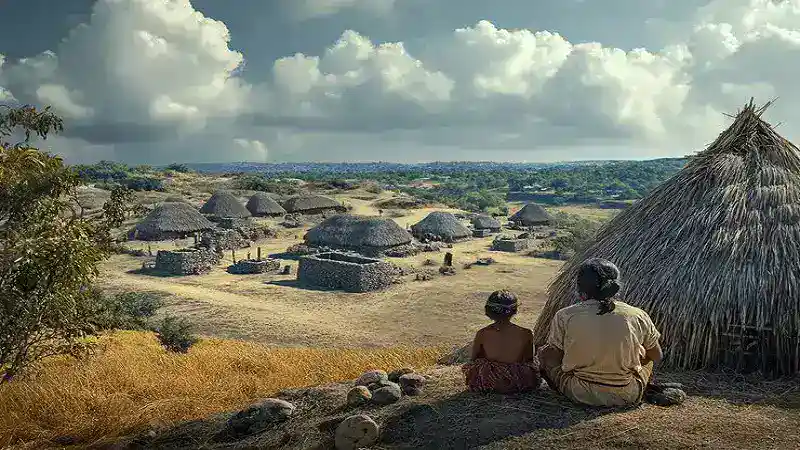Summarize The Plot of The Myth “The Beginnings of The Maasai.”
Myths and legends play a pivotal role in shaping the identity and cultural history of many societies. They are often used to explain the origins of people, their customs, beliefs, and connection to the natural world. For the Maasai people of East Africa, particularly in Kenya and Tanzania, one such myth is “The Beginnings of the Maasai.” This story holds deep significance for understanding the tribe’s relationship with cattle, their semi-nomadic lifestyle, and their spiritual beliefs. Let’s delve into the plot of this captivating myth to uncover the roots of Maasai identity. summarize the plot of the myth “the beginnings of the maasai.”
The Setting and Origins
The Maasai myth of origin begins in a time when the heavens and the earth were not yet separate, and the gods walked among men. The chief god in the myth is Enkai (also known as Engai or Ngai), the supreme deity of the Maasai. Enkai is viewed as a god of the sky, rain, and fertility, and the connection between heaven and earth.
At the start of the tale, the Maasai people lived harmoniously with Enkai. There was no separation between the heavens and the earth, and the Maasai were blessed with abundant cattle. According to the myth, Enkai bestowed these cattle upon the Maasai people, making them custodians of these precious animals. Cattle were central to the Maasai’s life and survival, and they became a symbol of wealth, status, and sustenance. They provided milk, blood, and sometimes meat, which sustained the tribe in their semi-nomadic lifestyle.
However, as the story unfolds, a great calamity occurs that changes the relationship between the heavens and the earth forever.
The Rift Between Heaven and Earth
One day, as the Maasai continued to live their blessed life, the earth and the sky began to separate. This event is often referred to as the “breaking of the sky,” where the once close bond between Enkai and the Maasai people was disrupted. The sky moved upward, becoming distant, and the direct access to the gods and the cattle was lost. The separation was a cataclysmic event that created a rift between the divine and the human world. summarize the plot of the myth “the beginnings of the maasai.”
This division greatly concerned the Maasai, as it meant they could no longer communicate directly with Enkai as they had before. The cattle, which had been seen as a divine gift, now needed to be cared for more carefully as their connection to the heavens had been severed.
The Role of the Maasai and Their Chosen Status
Even though the sky had moved away, Enkai still maintained a special relationship with the Maasai. According to the myth, Enkai decreed that the Maasai people were the chosen custodians of the cattle. This bestowed the Maasai with a divine duty to care for and protect the animals, as they were viewed as sacred gifts from the gods. The Maasai were given the responsibility of looking after these herds, and they believed that all cattle on earth rightfully belonged to them, regardless of who owned them.
This belief is central to the Maasai way of life and their worldview. It explains why cattle hold such importance within their culture. For the Maasai, cattle are not just livestock; they are deeply intertwined with their social, economic, and spiritual life. A Maasai’s wealth is measured by the size of their herd, and cattle are often used in rituals, as dowry in marriages, and for bartering.
The Arrival of the Dorobo People
While Enkai had chosen the Maasai to be the guardians of the cattle, there were other groups of people in the land. One of these groups was the Dorobo (also called Ndorobo), who were hunters and gatherers. Unlike the Maasai, the Dorobo did not receive cattle from Enkai, and they relied on hunting wildlife and gathering fruits for survival. summarize the plot of the myth “the beginnings of the maasai.”
As the Maasai myth goes, the Dorobo envied the Maasai for their close relationship with the gods and the abundance of cattle they possessed. However, Enkai had made it clear that only the Maasai were entrusted with the divine responsibility of caring for cattle. The Dorobo were left to live off the land in other ways.
The Importance of Rain and Fertility
Rain, in the Maasai myth, is a physical manifestation of Enkai’s blessing. Without rain, the grass would wither, and the cattle would starve. Rain was seen as a sign that Enkai was still watching over the Maasai people and their herds, ensuring that their livelihood continued to thrive.
As semi-nomadic pastoralists, the Maasai moved with the seasons in search of fresh pastures for their cattle. Rain was a key factor in determining where they would settle, as the availability of water and grass for their animals was vital to their survival. This dependence on rain led to a strong spiritual connection with Enkai, as the Maasai believed their deity controlled the rain and the fertility of the land.
To this day, the Maasai perform ceremonies and rituals to ask for Enkai’s blessings, especially during times of drought. Cattle are sometimes sacrificed in these rituals to please the god, with the belief that Enkai would send rain and restore balance to the land.
The Symbolism of Cattle in Maasai Culture
Cattle in the Maasai myth represent far more than just animals—they symbolize life, prosperity, and the Maasai’s divine connection to Enkai. The deep reverence the Maasai have for their herds can be traced back to this creation myth, where cattle were viewed as a divine gift from the gods. The belief that all cattle belong to the Maasai, regardless of ownership, is a reflection of their identity as the chosen people.
Cattle also play a central role in various Maasai rites of passage, such as initiations, weddings, and funerals. For example, during marriage ceremonies, the bride’s family receives cattle as dowry from the groom’s family. This exchange of cattle strengthens social bonds and signifies the union of two families.
Furthermore, cattle are central to the Maasai diet, providing milk and blood, which are consumed in various rituals. The use of cattle blood, mixed with milk, is a traditional Maasai drink and is believed to provide strength and vitality. This strong dependence on cattle for sustenance further highlights their sacred role within Maasai culture.
The Continuation of the Maasai’s Divine Role
Despite the separation of the heavens and the earth, the Maasai people continue to uphold their role as custodians of the cattle. Their semi-nomadic lifestyle, where they move with their herds in search of fresh pastures, reflects their enduring commitment to this divine duty. The Maasai maintain a deep respect for the environment, as they understand the delicate balance between nature and their livestock.
This connection to the land and their cattle has also shaped the Maasai’s resistance to modern pressures, such as land development and the encroachment of agriculture. While other tribes and communities have embraced farming or urbanization, the Maasai have clung to their pastoralist traditions, which they believe are divinely ordained. summarize the plot of the myth “the beginnings of the maasai.”
Conclusion: A Legacy of Divine Responsibility
The myth of “The Beginnings of the Maasai” encapsulates the core values and beliefs of the Maasai people. It explains not only their close relationship with cattle but also their deep spiritual connection to Enkai and the natural world. For the Maasai, their cattle are more than just a source of livelihood—they are a living representation of their covenant with the gods.
This myth has been passed down through generations, continuing to shape Maasai identity and their way of life. It serves as a reminder of their divine responsibility to care for the cattle and to live in harmony with the land. In an ever-changing world, the Maasai hold onto this ancient belief, ensuring that their traditions remain alive and vibrant in the face of modern challenges.
Through this myth, we gain insight into the Maasai’s respect for nature, their resilience, and their unwavering dedication to preserving their cultural heritage. The story of “The Beginnings of the Maasai” is a testament to the power of myths in preserving the history and values of a people, passed down through the ages to guide future generations. summarize the plot of the myth “the beginnings of the maasai.”





